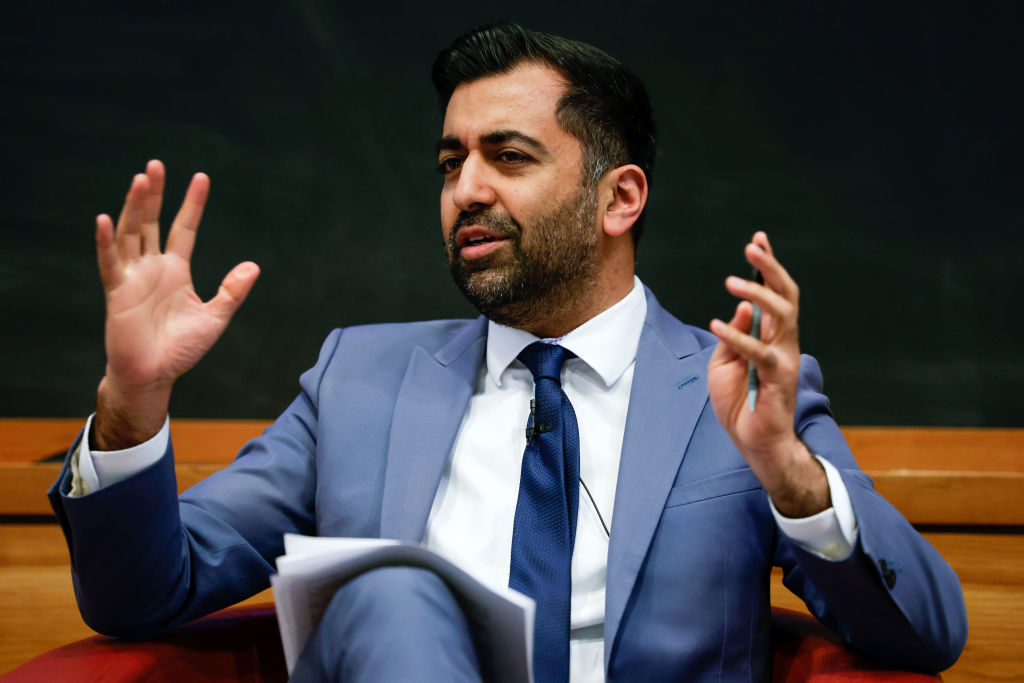Perhaps Humza Yousaf’s greatest achievement in his first 100 days as First Minister is that he has survived them. Since succeeding Nicola Sturgeon in March, Yousaf has stumbled from crisis to crisis. His leadership has played out like an extended episode of The Twilight Zone where, long ago, the lead character got the message that they should be careful what they wish for. The new First Minister inherited a party that showed no sign of losing its position as the dominant force in Scottish politics. Three months on, the SNP is in a mess with voters abandoning it in favour of a unionist Labour party.
Yousaf took power promising his supporters he’d built on the progress made towards independence by Sturgeon. Now he’s flailing around, trying to shore up the nationalist vote. In fairness to him, unimpressive though he is, it’s hard to see how he could have played the bum hand he received any better. Within days of becoming party leader, Yousaf faced the nightmare of a police raid on the home Sturgeon shares with her husband, former SNP chief executive Peter Murrell. Murrell was arrested and questioned as a suspect as part of a police probe into allegations of financial impropriety within the party. Soon afterwards, former party treasurer Colin Beattie MSP was lifted by cops and then, almost a month later, Sturgeon was arrested too.
In fairness to Yousaf, unimpressive though he is, it’s hard to see how he could have played the bum hand he received any better.
That investigation continues. Though no charges have been made at this stage, the entire process has been an impossible distraction for Yousaf, who spent much of the first weeks of his leadership giving a series of damaging interviews in which he offered running commentary on his party’s legal woes.
It was all supposed to be so very different. When Yousaf won the SNP leadership race and became Scotland’s sixth First Minister, he gave the obligatory speech — previously made by Sturgeon and Alex Salmond — in which he promised he’d be a leader to all Scots, not just the minority who back the break-up of Britain. And, as is also traditional, he then forgot that pledge and instead focussed his efforts on picking constitutional battles with the UK government.
This is standard practice for the nationalists, who are never happier than when explaining to Scots why they’d be better off without the malign influence of Westminster. The problem, however, is that for this sort of grievance-stoking to have any effect, the SNP requires voters to buy into the idea they’re being messed about by the UK government. The two big issues over which the SNP is currently choosing to fight constitutional battles — reform of the gender bill, and the introduction of a deposit return scheme for drinks containers — are wildly unpopular with voters. Yousaf knows and hopes that Scots will agree that his ‘principled’ position on these issues is more important than their personal dislike of them.
Aye, well, good luck with that. When the UK government blocked the Scottish gender bill on the grounds that it would negatively impact on the UK-wide equality act, even some members of the SNP were relieved. Likewise, it’s not just the nationalists’ opponents who believe the now-paused deposit return scheme is a mess.
A recent speech by Yousaf to a day-long independence convention was so rambling and incoherent that it was followed by a lengthy briefing during which the First Minister’s spokesman had to clarify exactly what he had meant. Those nationalists who believed they’d heard the SNP leader promising strides towards independence in the aftermath of the next general election were to be disappointed. In fact, Yousaf did little more than restate his commitment to finding a way of holding a second referendum. Since the power to hold another vote on Scotland’s place in the Union remains with Westminster, Yousaf’s pledge isn’t worth a hill of beans.
The First Minister’s insistence that independence is within grasp is further undermined by the decisions of a number of senior SNP politicians not to seek re-election. This week, the party’s deputy leader at Westminster, Mhairi Black announced she was quitting frontline politics at the next general election — becoming the sixth SNP MP to do so.
As Humza Yousaf marks 100 long, miserable days in power, he could be forgiven for wondering what fresh crisis awaits him in the days ahead. Right now, it seems that if it wasn’t for bad luck, he’d have no luck at all.







Comments